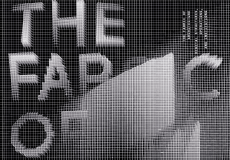Poiesis – The Fabric of Making

Georg Trogemann
Workshop lecture 25. and 26. June at the University of the Arts Berlin
Today we use bacteria to produce energy and we train slime molds how to calculate shortest paths. We utilize all sorts of organisms to implement technical functions and envision programmable matter that has the ability to freely change its physical properties dependent upon user input. But what is the common ground underlying the discussion of these different forms of artifacts and technics? The presentation will reintroduce the notion of “poiesis” to conciliate reason and perception with material and information. We consider this philosophical term as the still missing theory of all possible forms of production. The fact that a theory of “poiesis” has never been accomplished might be one reason that European culture hasn’t intellectually mastered technics. So it is hardly surprising that we still lack criteria to govern decisions regarding what should be produced in the nearly endless field of scientific and technical production. Hence this talk is not primarily about knowing “how” but more about knowing “why,” and will present specific examples that reveal some of the fundamental conditions of making.
General Workshop Information:
Nathalie Bredella and Carolin Höfler
The Fabric of Architecture -
Digital Structures, Operations, and Institutions
Every architectural design emerges from a process. The different tools and media constitutive of these processes in turn foster approaches to architecture, as well as the creation of new categories of knowledge. With the progressive development of computer-based design techniques, the contemplation of the procedural aspects of architecture becomes increasingly significant for the production and reception of architecture. It is from this perspective that the workshop sets out to examine the specific roles that processes and practices play in computer-based design by seeking to illuminate those techno-cultural contexts and historical and intellectual bonds that unite them. Which traditions and strategies, and what historical correlations among architecture, culture, and technology, have motivated and shaped the development of computer-based design processes?
The image of a fabric serves as an application and expression of the singular and inextricable entanglement of architecture, culture and technology in computer-based design. The interweaving of a textile creates a transitory co-planarity between information and material.
It emphasizes the active process of shaping as “structured form,” (Gebildetes) by which elements become enmeshed or knotted with each other. Considering architecture then as an analog to a fabric highlights how those numerous interactions with media and tools leave behind traces in material form. Likewise, processes of the imagination and inspiration effectively unfold in the design. Hence, the increasing automation of operations through digital media also brings to the fore the nature of the interaction between standardized and intuitive design processes.
How might the relationship between a rule-governed design process and the transgression of a predefined operational framework – a relationship aiming to produce new artifacts and knowledge – be determined? Furthermore, in what way does the interconnection of media, tools and design shape built architecture and its ensuing structures, control-processes and procedures?
With an eye toward these issues, the workshop discusses forms of knowledge production in architecture, including its technological, political, and economic requirements as well as the possibilities for an investigation into digital design cultures in architecture that transcend disciplinary boundaries.

